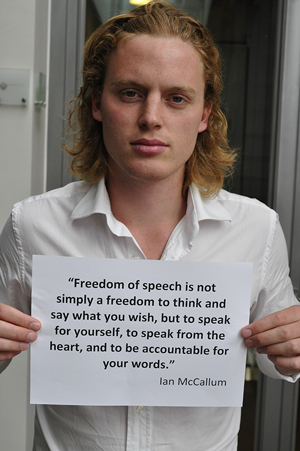Simeon Gready: An over-the-top regulation policy
This is the seventh of a series of posts written by members of Index on Censorship’s youth advisory board.
Members of the board were asked to write a blog discussing one free speech issue in their country. The resulting posts exhibit a range of challenges to freedom of expression globally, from UK crackdowns on speakers in universities, to Indian criminal defamation law, to the South African Film Board’s newly published guidelines.

Simeon Gready is a member of the Index youth advisory board. Learn more
Earlier this year, South Africa’s Film and Publication Board (FPB) released their Draft Online Regulation Policy.
The proposed regulations of this policy have huge implications for freedom of expression in South Africa, which can be summarised into the following:
• The policy claims to apply to films, games and “certain publications”. This is vague language that allows it to cover anyone publishing anything on the Internet.
• The policy allows for regulation of private personal communications.
• The policy states that anyone wishing to publish content on the internet need to apply and pay for an agreement with the FPB, meaning that individuals would be required to pay for their fundamental human right to freedom of expression.
• The policy further violates freedom of expression in that it asserts that it retains the right to take down “violent” content published by media outlets, thereby disallowing the media from being able to carry out its social responsibilities.
• The policy allows “classifiers” from the FPB to search distributor’s premises, unhindered and with no responsibility for loss or damage.
Worryingly, it has recently been announced that this policy has been approved to inform a new film and publications amendment bill. If signed into law, the repressive tactics outlined above could become a reality for South African citizens.
Simeon Gready, South Africa
Related:
• Anastasia Vladimirova: A ruthless crackdown on independent media
• Ravian Ruys: Without trust, free speech suffers
• Muira McCammon: GiTMO’s linguistic isolation
• Jade Jackman: An act against knowledge and thought
• Harsh Ghildiyal: Defamation is not a crime
• Tom Carter: No-platforming Nigel
• Matthew Brown: Spying on NGOs a step too far
• About the Index on Censorship youth advisory board
• Facebook discussion: no-platforming of speakers at universities
